“This was one of the goals on my list for this year,” Jutta Leerdam (NED) said after she successfully defended her European Sprint title in Hamar, Norway. The 24-year-old Dutchwoman finished the tournament in style, winning both the 500m and the 1000m on Saturday.
Femke Kok (NED), who had won the first 500m on Friday, finished second in the overall ranking, and 2019 champion Vanessa Herzog (AUT) took bronze.
On the first day of the women’s Allround competition, Antoinette Rijpma-de Jong (NED) laid a solid foundation for a third consecutive title in the first two distances.
Leerdam takes 500m revenge
“I’m not going to hold back,” Leerdam had promised after taking a 0.590-point lead on the first day of competition. “I want to test myself time and again. What can I do to be just that little bit faster again? And maybe I can do something else, coming in a bit more relaxed.”
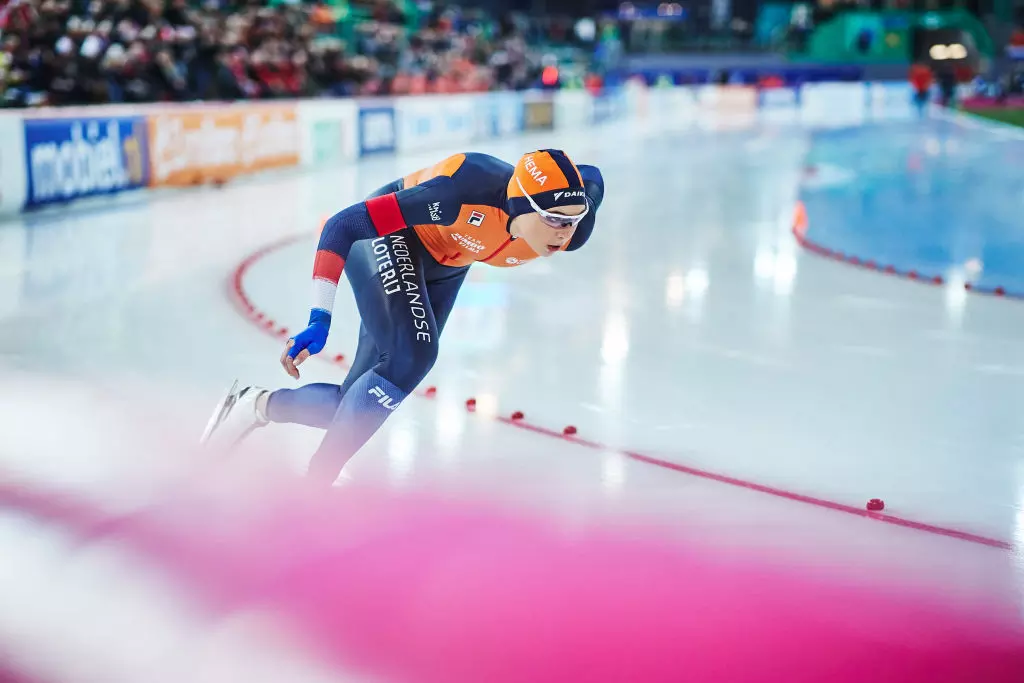
Jutta Leerdam (NED) avenged her defeat to Femke Kok in Friday's 500m by winning Saturday's second race by 0.11s. @ISU
Leerdam had to settle for second place to Kok in the 500m on Friday, but managed to pip her compatriot to the line in the return run on Saturday. Kok posted the fasted opener again, hammering out the first 100m in 10.57s, but Leerdam followed closely in 10.57s and used her strength in the full lap to beat Kok by 0.11s in a time of 37.76s.
“Today, my 500m was better [than my 1000m],” Leerdam said. It was the other way around compared to yesterday, when my 1000m was better than my 500m.”
Kok explained why she had not been able beat Leerdam a second time in the shortest distance.
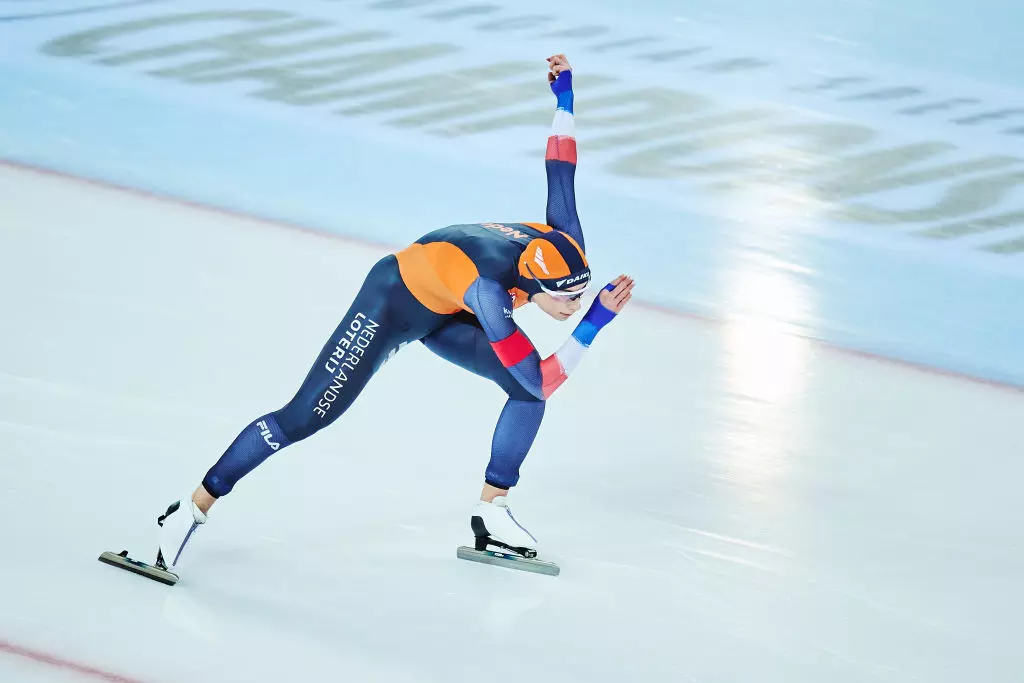
Femke Kok (NED) was unable to chase down compatriot Leerdam to repeat Friday's 500m triumph. @ISU
“I didn’t have a great start, but the first corner and the backstretch were really good actually,” she said.
“I felt that I was chasing her down, but that final inner turn, I felt so much pressure on my legs that I wasn’t able to accelerate through the corner, which is a shame because then you’ll lose a lot of time.”
Herzog, who started the 500m as third in the overall ranking, extended her tight lead over fourth-ranked Marrit Fledderus (NED), beating the Dutchwoman by 0.28s in their heat.
False start makes little difference
Heading into the Sprint championship’s final event, the 1000m, Leerdam was defending a 1.40s lead over second-ranked Kok. But despite the comfortable margin, the World Sprint Champion could not afford to be complacent, and received a wake-up call when the pair were called back to the line after a false start.
“You should never think that’s it’s over when you still have to skate,” Leerdam admitted afterwards.
“It’s about four distances, but I only realized that it could still go wrong after that false start.”
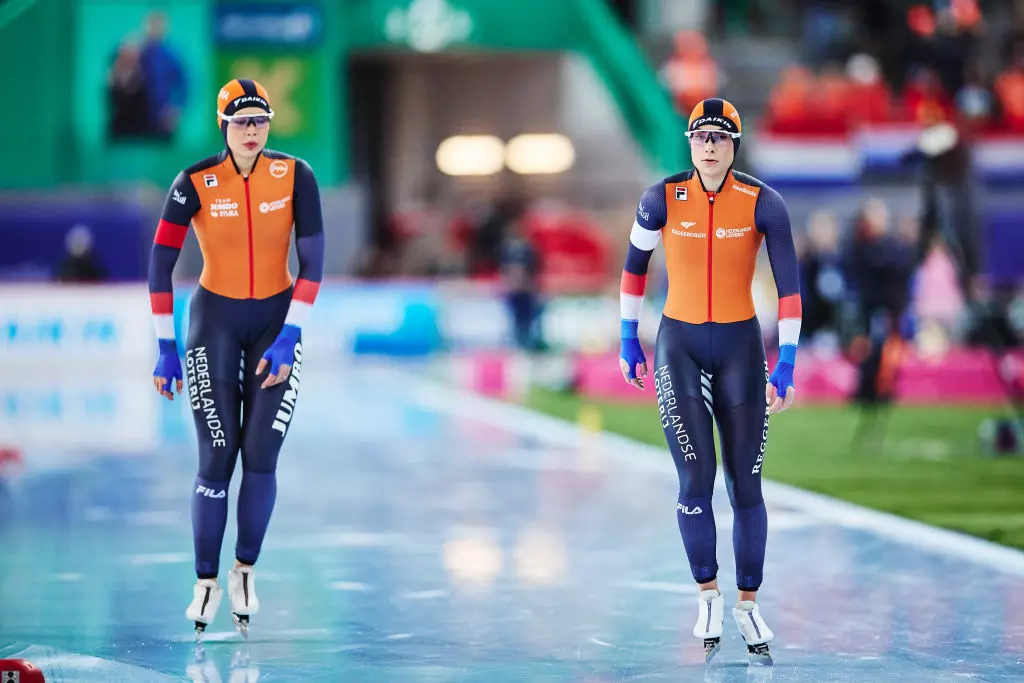
Dutch rivals Leerdam and Kok posted the fastest times in the 1000m but the 1.26s margin was too great for Kok to close. @ISU
Being put on edge helped Leerdam to focus and she easily won the 1000m in 1 minute and 14.80s, leaving Kok 1.26 seconds behind in second place.
“[Starting the last distance with a big margin] doesn’t really work well for me,” she added. “I’d rather be put under pressure. Now it didn’t really make a difference as long as I wouldn’t make any mistakes, but I skate best when I’m on edge.”
For Kok, finishing second was the best possible outcome after skating four races within 24 hours.
“Jutta was just too good. My goal today was just to skate two good races, which didn’t really work out actually,” Kok admitted.
“She’s in a flow. I had the same in my first senior year, when everything seemed to come easy. Of course I want to challenge her, but she’s in that zone at the moment and the only thing I can do is focus on myself.”
Herzog wins battle for bronze
At the start of the 1000m Herzog was 4.48s behind leader Leerdam, and defending a 1.27s lead over Fledderus for third place.
The Austrian finished her second 1000m in 1:17.19 for fifth place in the distance, extending her lead over Fledderus by 0.2s in the process to prevent a Dutch podium sweep.
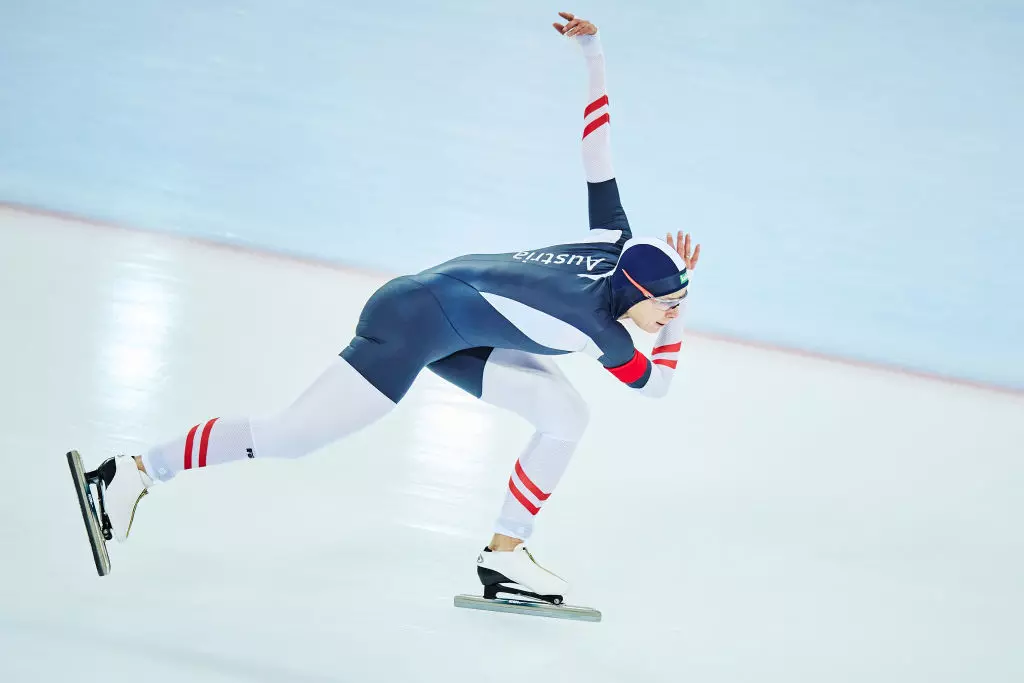
Vanessa Herzog (AUT) sealed the bronze medal with third place in the 500m followed by a solid fifth in the 1000m. @ISU
Despite the third place finish, Herzog wasn’t satisfied with her performances at the double distance.
“It was not my weekend,” she admitted. “The 1000m [races] were not good. The 500m [races] were OK, though not the best. But now, it's not the time to peak. We’ll see in two months [at the World Championships]”
Fledderus took sixth place in the 1000m, clocking 1:17.39 to retain fourth place in the overall ranking.
Ellia Smeding (GBR) finished Saturday’s 1000m in 1:17.13 to take third place in the final distance. The 24-year-old Briton ended up sixth in the overall ranking.
Solid Allround lead for Rijpma-de Jong
Two-time champion Antoinette Rijpma-de Jong (NED) had an excellent start in the Allround tournament on Saturday. In fact, with her 500m time of 38.55s, she would have ended up fifth in the women’s sprint field on Saturday.
“I’m really happy with that race,” she said.
Rijpma-de Jong was 0.48s faster than Marijke Groenewoud (NED) and 1.17s ahead of Robin Groot (NED).
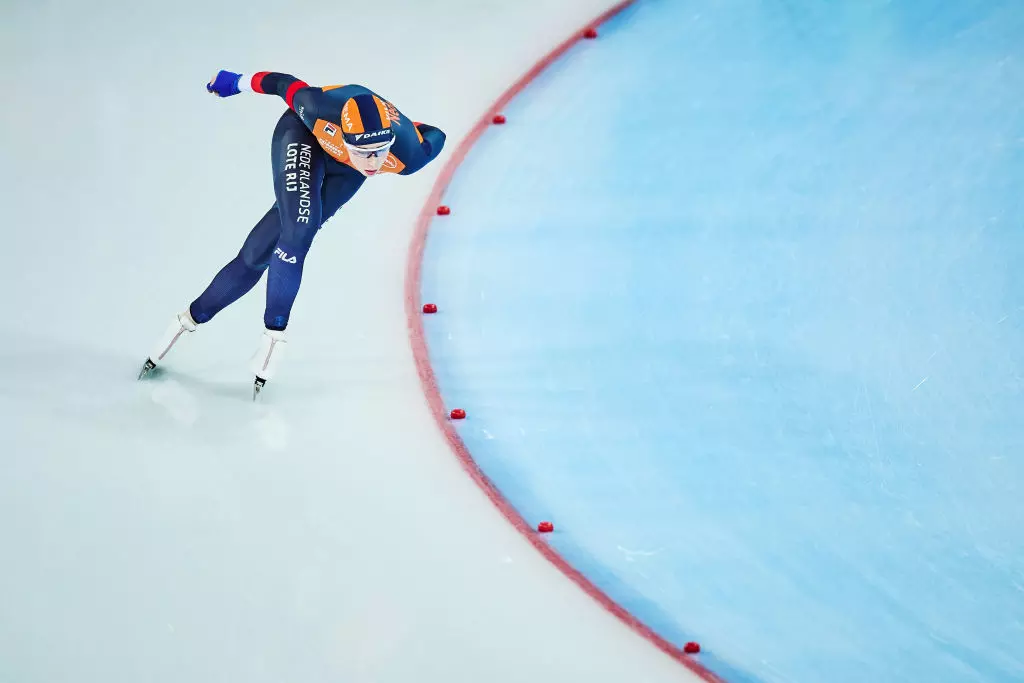
Antoinette Rijpma-de Jong (NED) is eyeing up a third European Allround title after taking the overnight lead in Hamar. @ISU
The 2019 and 2021 European Allround Champion then faced Ragne Wiklund (NOR) in the 3000m. After coming fourth in the 500m with a time of 39.76s, the Norwegian had to make up 7.02 seconds in the 3000m to pass her Dutch rival in the overall ranking.
Wiklund challenged Rijpma-de Jong in the 3000m, but the Dutch leader kept her in sight. The Norwegian was the only one to beat the four-minute mark in 3 minutes and 59.92s, but Rijpma-de Jong finished only 1.48s later to retain first position in the ranking.
The leader hopes to build an even bigger cushion over Wiklund in the 1500m on Sunday morning, because she fully expects the Norwegian to beat her in the 5000m.
“I just want to go flat out in the 1500m,” Rijpma-de Jong vowed.
Wiklund is not the only skater to hold a threat for Rijpma-de Jong, however. After two distances, Marijke Groenewoud (NED) is ranked second, while Wiklund lies third. As it stands, Groenewoud has to make up 2.83s in tomorrow’s 1500m to pass Rijpma-de Jong, while Wiklund is 2.89s behind.
Format and schedule
The Sprint Championships are held on Friday and Saturday with a 500m and a 1000m for both genders on each day. The Allround Championships are scheduled on Saturday and Sunday. The men will skate the 500m and the 5000m on the first day, followed by the 1500m and the 10,000m on the second. The women face the 500m and the 3000m on Saturday, followed by the 1500m and 5000m on Sunday.
In both the Sprint and the Allround tournaments the final ranking is based on the so-called samalog score over four distances. The samalog system converts times into points, with the 500m as starting point. For a 500m race, the number of seconds counts as the number of points. For the 1000m the number of seconds is divided by two to calculate the number of points; for the 1500m it’s divided by three, for the 3000m by six, for the 5000m by ten and for the 10,000m by twenty.
For all information about the ISU European Speed Skating Championships, please visit the webpage here.
Where to watch
Viewers will be able to watch the ISU European Speed Skating Championships (local time) via their national broadcaster/channel.
For countries where there are no broadcasters, the ISU will offer a live stream on the Skating ISU YouTube Channel. You will find the full list on the Where to watch webpage here.



.png)

